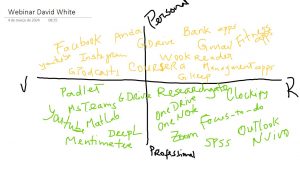I’m attending the ONL 241 course which is very challenging as I don’t have much available time (as many other people). But I’m finding it very interesting and useful!
Last week I watched the recording of the webinar with David White, which was very inspiring. David challenged the participants to draw a map of their footprint in the digital world. I thought it could be funny to draw mine and was surprised with what I got.

I thought of myself as a technological person, as I always look for tools that can make life (and especially work) easier and less time-consuming. Now, I consider ‘technology’ as a set of tools, and ‘digital’ as the way of using technology, but I’m not sure if technology is always digital. Is it?
Maybe I am more ‘digital’ than I thought I was. In fact, I never thought about the concept of digital applied to me. Nevertheless, as an example, I almost don’t use pen and paper to take notes… I use OneNote for professional notes, and Goggle Keep for personal ones.
Doing the map, I realised that I have two identities that I keep separate: the personal (in yellow) and the professional (in green).
It seems that I am moving through the continuum, being more of a visitor in some digital spaces and more of a resident in others. For example, I use Facebook and Instagram with personal accounts, but I almost don’t post anything there as I don’t like to expose my personal life. In the professional spot, essentially, I use tools that enhance productivity. Still, I am distant from being a real resident in the sense of producing content for digital sharing, that is, for sharing on the internet. But I have a doubt… being a resident in David White’s continuum means being an expert in the use of digital tools, or it means leaving a footprint on the internet?
The internet can be a very dangerous place, especially for personal exposure! Besides phishing practices, when we expose our opinions, we are subject to receiving unpolite comments from people who disagree. Yes, disagreement is positive as it can lead people to think better about a subject, but rudeness is not acceptable.
That brings me to the scenario set up for topic 1, ‘online participation and digital literacies’, and the debates in the Take V PBL group meetings. The group has come to focus on Critical Thinking Skills (CTS) as being important to filter the huge amount of information available on the internet. Critical thinking allows people to evaluate the trustworthiness of the information and its applicability. I believe that CTS are fundamental for every person in every context and not only for digital use. CTS should be developed in educational contexts since early childhood. I believe that the development of CTS could impact positively on relationships and, therefore, contribute to a better world as it would improve inclusion and social justice.
Is it a utopian view? I don’t believe in utopia, as several past utopias are a reality nowadays.
Best,
AD
